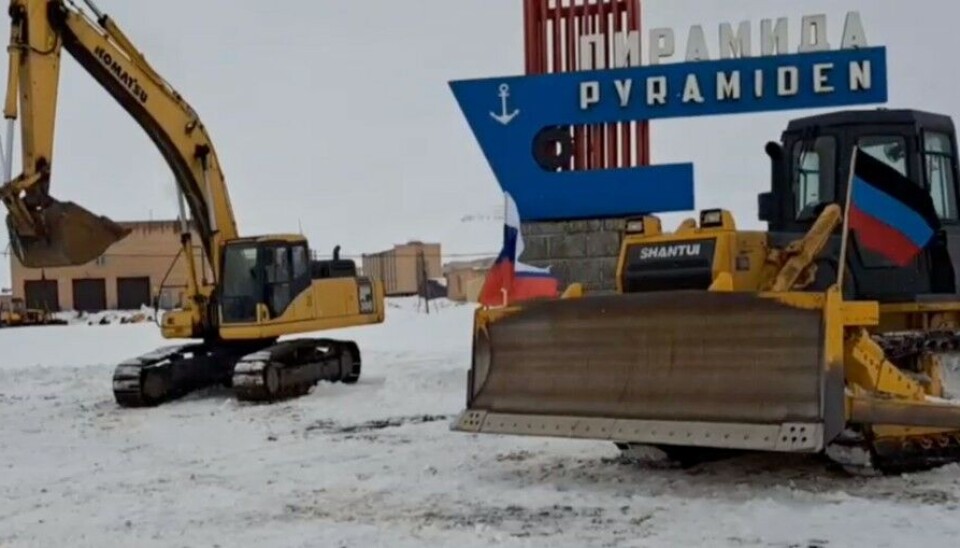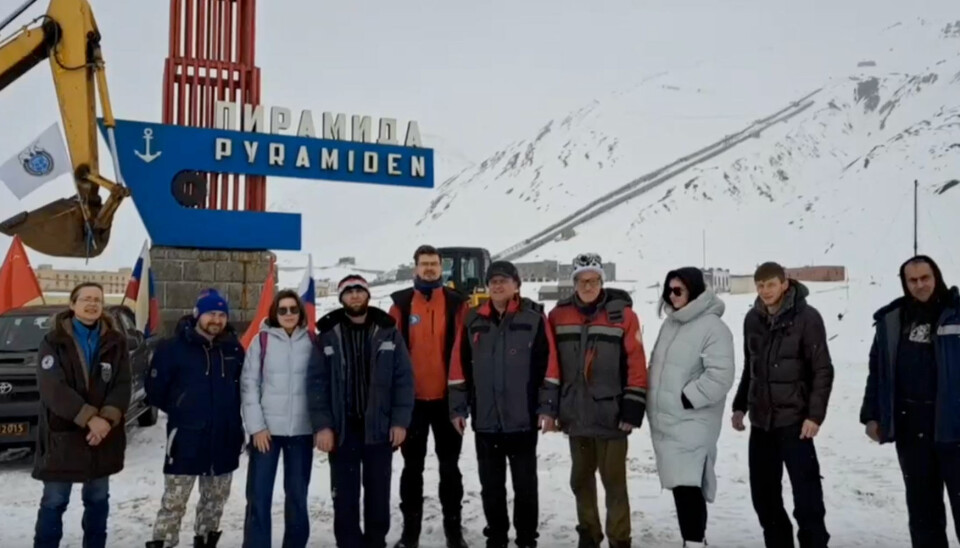
Russian separatist flag waved on Svalbard
The Russian state company Trust Arktikugol organised a May 9th parade in the settlement of Pyramiden. It included a snowmobile, a car, bulldozer and excavator. And a flag of the so-called Donetsk People's Republic.
There was great festivity among the Russians living in the Norwegian Arctic archipelago of Svalbard on the 9th of May.
In the streets of Barentsburg, the town inhabited mainly by Russians, a parade headed by Russian General Consul Andrei Chemerilo included more than 50 vehicles, among them ten snowmobiles run by men in green military-like uniforms. And in the air, a Mi8 helicopter flew low over the crowd.
Practically all of the people in the settlement took part in the event, Arktikugol informs.
And the Russian state company that operates the local coal mine and runs local tourism activities, organised patriotic celebration not only in Barentsburg.
Also in Pyramiden, the small settlement located about 120 km further northeast, there was a “victory parade.” A video shared by Trust Arktikugol shows a group of at least 11 people organising a parade that included a car, a snowmobile, a bulldozer and an excavator. The vehicles that moved down the snow-covered road were decorated with the Russian tricolour, the Soviet flag and the company flag of Trust Arktikugol.
And not only. On the bulldozer, the organisers had put the flag of the so-called Donetsk People’s Republic, the breakaway region that has been central in Russia’s war against Ukraine since 2014.
The disputed and occupied region that was annexed by Russia ahead of its full-scale war against Ukraine in late February 2022 is a main symbol of Russia’s aggressive war against the neighbouring country, as well as the lawlessness and extremism of the local Russian authorities in the region.
The flag is also a symbol of Russian-backed separatism.
The Trust Arktikugol offers no explanation why it put the Donetsk flag on the bulldozer in Pyramiden.

The small “ghost town” of Pyramiden was abandoned by coal miners in the late 1980s and now houses primarily tourism developers from Trust Arktikugol.
There were also several more local events in connection with the 9th of May. In the local diplomatic office in Barentsburg, General Consul Andrei Chemerilo organised a reception for the local Russian elite, among them the leaders of Russian research organisations and the local Russian state company Trust Arktikugol. And in the local cultural hall, a patriotic propaganda concert was held with participants dressed in military uniforms and carrying the St.George ribbon, the symbol of Russian war aggression extensively used in various patriotic events.
The increasingly patriotic Russian victory day celebrations in Svalbard coincide with a more active debate on Russia’s presence in the archipelago. Only over the past few months, the Trust Arktikugol and its newly appointed leader Ildar Neverov has organised a number of seminar, public meetings and gatherings about Russia’s role in the region.
In a recent presentation delivered in the downtown Moscow Gagarin Museum by former General Consul Sergei Gushchin, the diplomat warned against a weaker Russian presence in the archipelago.
“If we leave, our place is likely to be replaced by the USA, UK or other NATO countries,” he underlined. He also warned against what he described a gradual Norwegian militarisation of the islands.
“Spitsbergen is not something distant and strange for us, it is inseparably connected with the history of our country and is part of our historical, cultural and research heritage,” he underlined in the presentation.
Similar debates are taking place in so-called Scandinavian Club at MGIMO, the Moscow State Institute of International Relations. The same Scandinavian Club is also behind a new report titled “Spitsbergen 2033: perspectives for Russian presence.”
The report outlines two main scenarios; one where Norway militarises the archipelago and pushes out the Russians, and another where Norway “continues to create obstacles but takes no radical steps.”
According to the authors, Russia and its Trust Arktikugol should by 2033 take several measures in the area and establish a joint Russian-Norwegian rescue and emergency base.
Under the 1920 Svalbard Treaty, Norway has full and absolute sovereignty over the archipelago. Citizens from signatory countries, like Russia, have equal rights of abode as Norwegians.

Until recently, the settlement of Barentsburg had a mixed Russian-Ukrainian population. But that has now changed, says Timofei Rogozhin, the former leader of the tourism branch of Trust Arktikugol.
“Almost all citizens of Ukraine have left,” Rogozhin says to the Barents Observer. “They began to leave in the first days of the war and throughout 2022. According to my estimate, at least 50 people left. Maybe more.”
He is very critical of Aktikugol’s behavior at Svalbard. Especially after the brutal attack on Ukraine.
“The past year has turned a civilized modern village with an open and friendly society into some kind of grey closed and aggressive swamp. If you look at social networks [in Barentsburg], you can clearly see a systematic desire to return to the Soviet system and totalitarianism,” Rogozhin says.















